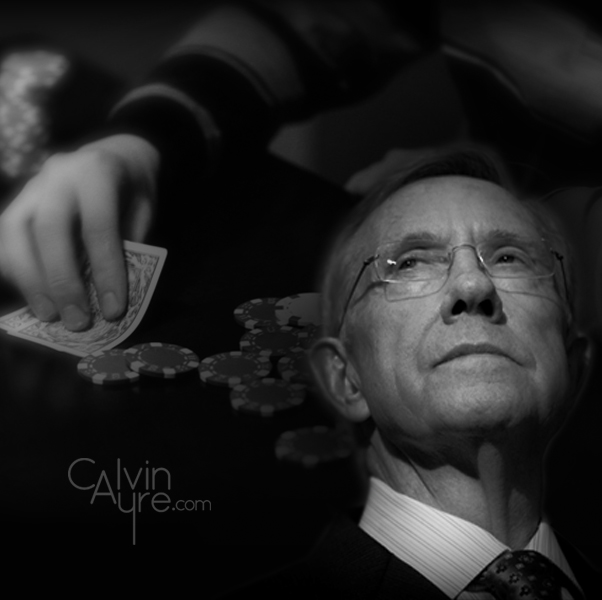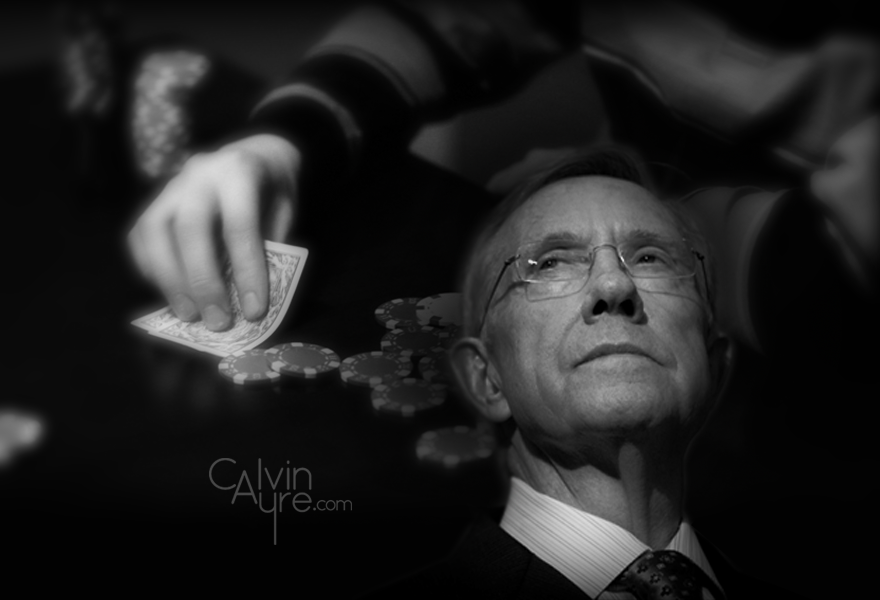Thanksgiving is probably my favorite American holiday. It’s all about taking a break for one day to do nothing but recognize the good things you have in your life, like the opportunity to eat great food and hang out with the people you love while doing the things you love. Unlike with so many other American holidays, it’s kind of hard to go wrong with Thanksgiving.
After returning from the family feast and sitting down to my computer tonight I started thinking about poker. With millions of players’ money still being tied even after the DOJ-brokered sale of Full Tilt, an utter lack of traction toward an open American online poker market open, and the lack of opportunity to take advantage of the game’s global growth, it’s arguably been a tough year for American poker players looking for something worth being thankful about. Putting those things aside, though, I still think there are a few bright spots for Americans in poker this year.
 Harry Reid. I really think that anyone who loves online poker and wants to see it continue to be a great pastime ought to be thankful for Harry Reid. In the hands of some other Senate Majority Leader, a bill levying heavy taxes and incredibly strict regulations on the American online poker market might have already become law. Sure, if that were the case, there would be a lot of people online playing poker who aren’t doing so right now. But they’d be doing so in a strictly regulated market whose high costs would be passed on in the form of high rake, making it very, very difficult for the vast majority of players to ever turn even the smallest profit playing online poker.
Harry Reid. I really think that anyone who loves online poker and wants to see it continue to be a great pastime ought to be thankful for Harry Reid. In the hands of some other Senate Majority Leader, a bill levying heavy taxes and incredibly strict regulations on the American online poker market might have already become law. Sure, if that were the case, there would be a lot of people online playing poker who aren’t doing so right now. But they’d be doing so in a strictly regulated market whose high costs would be passed on in the form of high rake, making it very, very difficult for the vast majority of players to ever turn even the smallest profit playing online poker.
Reid deserves our thanks because failing to get such a regime implemented through a standalone bill, failing to attach it to a payroll bill early this year, and not yet having attached it to any other must-pass bill during the Senate’s current lame-duck session. Not only are the mechanisms of the Reid-Kyl bill cumbersome and artificially limiting to the market in numerous ways, but the bill’s constitutionality has been called into question by a former U.S. solicitor general.
Bad law and bad enforcement – namely the UIGEA and Black Friday – are the biggest problems with the current American poker market. Adding more bad law and bad enforcement isn’t the solution, and Harry Reid, despite his best efforts, has kept that from happening so far.
American pros staying on top of the game. By just about any measure, it’s been an incredible year for American pros at tournaments around the world:
- Antonio Esfandiari won the world’s first million-dollar-buy-in poker tournament and another WSOP bracelet.
- Greg Merson won the WSOP Main Event against a field that featured seven other Americans, won another bracelet in a preliminary event, and won the WSOP Player of the Year award.
- Phil Hellmuth won the WSOP Europe Main Event and almost beat Merson for POY.
- Phil Ivey returned to the scene with a Super High Roller win in Australia and five WSOP final tables.
- Dan Smith has piled up $3.65 million in winnings, mostly from running over High Roller fields around the world.
Even while the government’s been hard at work denying poker to millions of Americans, our pro players have demonstrated that America’s reputation as the world’s top poker country is still very much secure. Some other nation might steal it away someday…but it’s going to be a while.
The game itself. Long before the online poker boom came around, before there were traveling tournament circuits spanning the world, poker was a pastime enjoyed by Americans of all walks of life. The fact is that people here just enjoy socializing – with their families, their friends, their coworkers, and even with total strangers – and at its heart poker is a social game.
The tens of millions of Americans who had some kind of knowledge of the game before the boom came along are mostly still around now that the boom’s long gone. And the tens of millions more who picked up poker during the boom – well, some of them have moved on to other hobbies, but a lot of them are still playing, too. That adds up to the biggest player pool the country has ever known, which means that you’re really never too far from a game with someone who knows someone you know.
Maybe it’s a $1/$2 no-limit game your cousin’s friend runs in his garage ever other week, or occasional $20 heads-up matches with your neighbor over a glass or three of whiskey, or a game of pot-limit Omaha played with Bitcoins online. It doesn’t really matter what the particular form is; if you’re an American who wants to play poker, you’re probably playing regardless of what the government says about it. Legalization, commercialization, and regulation are the things people hang on the game of poker to make money from it without having to actually go to the trouble of learning to play. Those things come and go with the political tide. The game belongs to the people, and for that reason alone it never goes anywhere. That’s something I can be thankful for.






